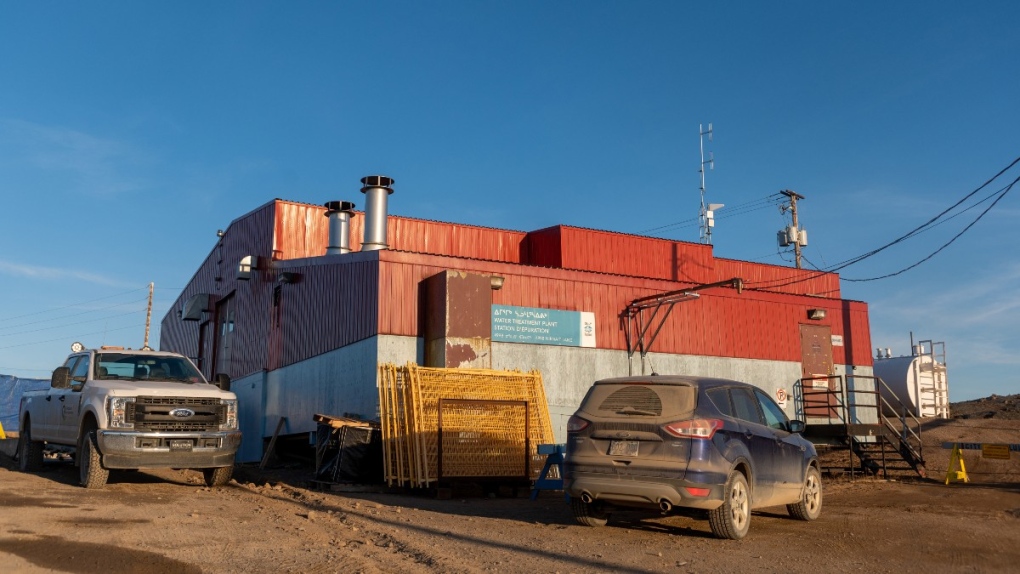
'Cybersecurity incident' shuts down London Drugs stores across Western Canada
All 79 locations of pharmacy and retail chain London Drugs were shut down Sunday after it was the victim of a “cybersecurity incident.”
The City of Iqaluit says it is working to find an alternate source of drinking water following a recurrence of fuel odours in its municipal water distribution system.
In an update posted to social media on Sunday, the city says the water that's been tested remains safe under Canadian guidelines.
But it says it recognizes residents may be uncomfortable consuming or using tap water that has residual odours of fuel, which is why it says it's working to provide an alternative source for affected residents "as quickly as possible."
Nunavut's health department says it is working with the city to address the problem, but notes in a weekend news release that the fuel amounts do not exceed Health Canada Drinking Water values for health.
Iqaluit's approximately 8,000 residents spent nearly two months under a do-not-consume order last fall after fuel was found in the water, which the city has said came from a historic underground fuel tank.
On Friday, the city said trace amounts of fuel were detected earlier in the week, just over a month after the do-not-consume order was lifted.
"Petroleum Hydrocarbons can be detected by the human nose at very low concentrations, at levels much lower than instrumental detection or laboratory analysis," the city said in a Facebook post on Sunday afternoon.
"While all recent test results are at or below detection limits, the City understands that this is a serious concern for residents."
Mayor Kenny Bell said Friday that the water is safe to drink, but some people have complained on social media that alternatives such as bottled water should be provided like they were before.
With temperatures in the minus thirties, some residents have started drilling holes in the ice at the Sylvia Grinnell River outside of the city to get water.
During the fall, a state of emergency was declared in Iqaluit and the military brought in a reverse-osmosis purification system to treat river water.
The city's Facebook post on Sunday didn't specify what alternative the city was seeking for drinking water.
The city noted in the post that it continues to flush its system and people might continue to smell fuel.
It said that while its data indicated trace amounts of fuel entered the system last Monday and again on Wednesday, they were below the alarm limits, which it noted are well below the Canadian limits.
Nevertheless, it said the city further lowered the alarm limits for "additional early warning" for future events.
The Nunavut health department said it will provide an update on Monday.
This report by The Canadian Press was first published Jan. 16, 2022.

All 79 locations of pharmacy and retail chain London Drugs were shut down Sunday after it was the victim of a “cybersecurity incident.”
Three women diagnosed with HIV after getting 'vampire facial' procedures at an unlicensed medical spa are believed to be the first documented cases of people contracting the virus through a cosmetic procedure using needles.
Elias Lindholm scored 1:02 into overtime and the Vancouver Canucks came all the way back to beat the Nashville Predators 4-3 in Game 4 of their first-round playoff series on Sunday.
One person was killed in a six-vehicle crash on Highway 400 in Innisfil Friday evening.
Aerial photos posted by Chinese state media on Sunday showed wide devastation in part of the southern city of Guangzhou after a tornado swept through the day before, killing five people, injuring dozens others and damaging more than 140 buildings.
Ontario is introducing a suite of measures that will crack down on cellphone use and vaping in schools.
Australia's Prime Minister Anthony Albanese on Monday described domestic violence as a 'national crisis' after thousands rallied around the country against violence toward women.
Rookie goalie Arturs Silovs will start in net for the Vancouver Canucks when they face the Nashville Predators in Game 4 of their first-round playoff series Sunday.
U.S. intelligence officials have determined that Russian President Vladimir Putin likely didn't order the death of imprisoned opposition leader Alexei Navalny in February, according to an official familiar with the determination.

The lawyer for a residential school survivor leading a proposed class-action defamation lawsuit against the Catholic Church over residential schools says the court action is a last resort.
Raneem, 10, lives with a neurological condition and liver disease and needs Cholbam, a medication, for a longer and healthier life.
As if a 4-0 Edmonton Oilers lead in Game 1 of their playoff series with the Los Angeles Kings wasn't good enough, what was announced at Rogers Place during the next TV timeout nearly blew the roof off the downtown arena.
Mounties in Nanaimo, B.C., say two late-night revellers are lucky their allegedly drunken antics weren't reported to police after security cameras captured the men trying to steal a heavy sign from a downtown business.
A property tax bill is perplexing a small townhouse community in Fergus, Ont.
When identical twin sisters Kim and Michelle Krezonoski were invited to compete against some of the world’s most elite female runners at last week’s Boston Marathon, they were in disbelief.
The giant stone statues guarding the Lions Gate Bridge have been dressed in custom Vancouver Canucks jerseys as the NHL playoffs get underway.
A local Oilers fan is hoping to see his team cut through the postseason, so he can cut his hair.
A family from Laval, Que. is looking for answers... and their father's body. He died on vacation in Cuba and authorities sent someone else's body back to Canada.
 City of Iqaluit water treatment plant in Iqaluit, Nunavut, on Oct. 27, 2021. (Dustin Patar / THE CANADIAN PRESS)
City of Iqaluit water treatment plant in Iqaluit, Nunavut, on Oct. 27, 2021. (Dustin Patar / THE CANADIAN PRESS)